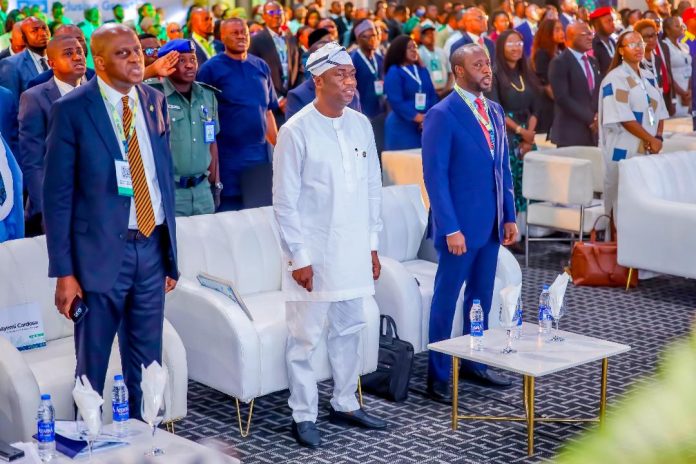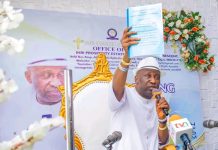Lagos State Governor, Babajide Olusola Sanwo-Olu has urged various governments and Stakeholders in Nigeria to remain focused on building a more inclusive economy, where no one is left behind, where every voice matters, and where every individual has a fair chance to succeed.
Sanwo-Olu stated this on Tuesday, at the 2024 International Financial Inclusion Conference (IFIC 2024), organized by the Central Bank of Nigeria (CBN), with the theme “Inclusive Growth: Harnessing Financial Inclusion for Economic Development”, held at Landmark Event Centre, Victoria Island, Lagos.
The Governor, who was represented by his Deputy, Dr. Kadri Obafemi Hamzat urged everyone to focus on the pursuit of financial inclusion.
His words: “Let us continue this work with passion, purpose, and a shared vision of a Nigeria where every citizen has access to the tools and resources they need to prosper. Let us remain focused on building a more inclusive economy where no one is left behind, where every voice matters, and where every individual has a fair chance to succeed.” He counseled.
Speaking on the aptness of the theme of the event, Sanwo-Olu stressed that financial inclusion is ultimately about people, lifting people out of poverty, empowering them to make choices, and enabling them to build better lives for themselves and their families, adding that it is about ensuring that hardworking people can contribute and benefit from the economic growth of the nation.
He elucidated that in Lagos and across Nigeria, ensuring financial inclusion means creating pathways for millions of her citizens to access opportunities and to rise beyond limitations that poverty, unemployment, and geographic constraints might impose.
Sanwo-Olu highlighted that the state and nation has seen the positive impact of small business owners, artisans, and traders, who with the access to financial tools, have moved from barely surviving to thriving.
He opined that technology must be accompanied by a human-centered approach that values the needs, culture, and aspirations of the people it seeks to serve.
“In Lagos, we are embracing the advancements of technology and supporting policies that foster Fintech growth. We believe that technology is a vital tool for empowering people economically, especially when deployed with inclusivity at its core,” Sanwo-Olu said.
He stated further that the government recognized its role in facilitating the journey of small business owners by removing barriers, enabling policies that protect and empower, and collaborating with financial institutions to ensure that these opportunities are available to everyone.
Commending the Central Bank of Nigeria and its partners for fostering a more inclusive financial landscape in the country, Sanwo-Olu noted that their efforts are yielding results. He therefore admonished Nigerians not to become disillusioned, adding that the road ahead is still long and there is much to be done.
In his welcome address, the Governor, Central Bank of Nigeria, Mr. Yemi Cardoso, said that the Central Bank of Nigeria has been working assiduously to stabilise the economy, working through Monetary policy to tame inflation and rebuild the confidence of the Nigerian people in its economy.
Cardoso emphasised that financial inclusion is central to achieving broad-based economic growth, stressing that Economically, financial inclusion impacts poverty reduction, income equality, employment generation, and overall productivity. “When more people have access to formal financial services, they are better able to save, invest, and contribute to the economy,” he said, noting that Financial Inclusion ensures that people have access to bank accounts, credit, savings, and other essential services. Cardoso noted.
According to him, widespread access to financial services is an enabler of economic activity. Micro, small, and medium enterprises (MSMEs) which are the backbone of Nigeria’s economy can thrive with improved access to credit, creating jobs and boosting productivity.
The Governor reiterated that financial inclusion is foundational to Nigeria’s sustainable economic development and as such, the Central Bank of Nigeria is keen on ensuring its Financial Inclusion policies and initiatives address the peculiar access to finance barriers for underserved populations, particularly Women, Youth, and MSMEs.
Furthermore, Cardoso emphasized that financial inclusion has the potential to unlock significant economic growth, particularly through the empowerment of small and medium-sized enterprises (SMEs), women and other vulnerable segments of the population. SMEs are responsible for over 80% of employment in Nigeria, yet many struggle to access the credit needed for expansion. Financial inclusion for SMEs is essential to unlock the full potential of this sector, and the Nigerian government remains committed to supporting these enterprises.
Earlier in his opening remark, the Deputy Governor, Financial System Stability (FSS) at the Central Bank of Nigeria (CBN), Mr. Philip Ikeazor stressed the importance of the conference, saying that it offers an invaluable opportunity to share insights, challenge assumptions, and explore new strategies that will bring citizens closer to achieving the shared goal of inclusive economic growth.
He stated further that the Central Bank of Nigeria is committed to fostering collaborations among different stakeholders to ensure that financial inclusion initiatives are effectively implemented across the country.
Ikeazor added that financial inclusion is the cornerstone of any robust economic development strategy. He noted that ensuring all citizens, especially those in underserved regions, have access to essential financial services, the government is unlocking the potential for sustainable and inclusive growth.
In Ikeazor’s words, “As we look ahead, it is clear that achieving 95% financial inclusion in Nigeria requires concerted efforts from all stakeholders—government agencies, financial institutions, Financial Technology companies, development organizations, and civil society.”
Speaking on the launch of the National Financial Inclusion Strategy in 2012 which serves as a roadmap towards reducing the country’s adult financial exclusion rate, the Deputy Governor highlighted that Since the launch of the Strategy which is currently in its third iteration, the Central Bank of Nigeria and stakeholders have worked tirelessly to reduce financial exclusion rates. Owing to these efforts, the exclusion rate has dropped from 46.3% in 2010 to 26% as of 2023.















